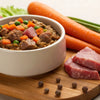Do Dogs Need Puppy Food? Understanding the Importance of Nutrition for Growing Dogs
- Houndsy
Table of Contents
- Introduction
- Understanding Puppy Nutrition
- The Impact of Puppy Food on Development
- Choosing the Right Puppy Food
- Transitioning from Puppy Food to Adult Dog Food
- Monitoring Your Puppy’s Growth
- Conclusion
- FAQs
Introduction
Did you know that nearly 61% of dogs in the U.S. are classified as overweight or obese? This startling statistic highlights the critical importance of a dog’s diet throughout its life stages, particularly during the crucial growth phase of puppies. As pet owners, we often question whether we are providing the right nutrition for our furry friends. One of the most common inquiries is: do dogs need puppy food?
This blog post aims to shed light on the specific nutritional requirements of puppies and why it's essential to feed them specially formulated puppy food during their early development. By the end of this article, you’ll gain insights into the differences between puppy food and adult dog food, how to choose the right food for your pet, and how to transition between the two as your puppy matures. We invite you to reflect on your own pet’s feeding routine and consider if any adjustments are necessary for their health and well-being.
Let’s dive in!
Understanding Puppy Nutrition
The Nutritional Needs of Puppies
Puppies experience rapid growth and development, requiring a unique set of nutrients to support their bodily functions and energy needs. Some key nutrients crucial for puppies include:
- Protein: Necessary for muscle development and overall growth.
- Fats: Provide a concentrated source of energy and support absorption of essential vitamins.
- Vitamins and Minerals: Such as calcium and phosphorus, important for healthy bone growth.
Each of these components plays a vital role in shaping your puppy into a healthy adult dog.
Differences in Puppy vs. Adult Dog Food
The primary distinction between puppy food and adult dog food lies in their intended purpose. Puppy food is formulated to support growth and development, whereas adult dog food is designed to maintain health.
-
Protein: The Association of American Feed Control Officials (AAFCO) recommends at least 22.5% protein in puppy food compared to 18% for adult food.
-
Fat: Puppy food typically contains higher fat levels to provide extra calories, reflecting their energetic nature. AAFCO sets a minimum of 8.5% fat for puppy formulas compared to 5.5% for adults.
-
Calcium & Phosphorus: These minerals are critical during the puppy stage for bone growth, with puppy food usually containing 1.2% calcium versus 0.5% in adult formulations.
-
Caloric Density: Puppy food has higher calorie density to meet the energy demands of growing puppies, ensuring they have the necessary fuel for their energetic activities.
Why Puppies Need Specialized Nutrition
Imagine the delicate balance required for a puppy's growth. Their nutritional needs are infinitely more complex than those of adult dogs. Puppies use approximately half of their caloric intake solely for growth, and an inadequate diet could lead to a host of development issues, including fractures, heart disease, and bone malformation.
The Impact of Puppy Food on Development
Healthy Growth and Development
Puppy food is meticulously formulated to ensure that growing puppies get the perfect balance of nutrients. It helps to establish a strong foundation for health, including:
- Robust bone structure
- Muscle development
- Proper cognitive functions through DHA (docosahexaenoic acid), which is crucial for brain health
As veterans in promoting responsible pet care, we at Houndsy understand that nurturing includes the right nutrition. Our motto emphasizes making feeding routines as simple and desirable as possible.
Long-term Health Implications
Choosing a diet specifically created for puppies can significantly impact long-term health. With the right nutrients during their formative year, puppies can develop into adults that are less prone to metabolic disorders and obesity-associated health issues. Studies show that puppies fed a balanced diet are more likely to grow into healthy adults, achieving an optimal weight and minimizing the risk of diseases later in life.
Choosing the Right Puppy Food
Ingredients to Look For
When selecting puppy food, it’s essential to keep an eye on the ingredients. Here are key aspects to consider:
-
High-Quality Protein Sources: Look for real meat as the first ingredient.
-
Healthy Fats: Ensure the presence of Omega-3 and Omega-6 fatty acids to support skin, coat, and cognitive health.
-
Whole Grains versus Fillers: Select foods that contain whole grains or vegetables rather than fillers like corn, soy, or by-products.
Recognizing AAFCO Standards
As pet owners, we should claim the best for our furry friends. This includes understanding food regulations. Opt for brands that comply with AAFCO standards for growth, ensuring that the puppy food is not only complete but is also formulated based on well-researched nutrient profiles.
At Houndsy, our mission aligns perfectly with the driving principles behind optimal puppy nutrition, ensuring our products meet industry benchmarks.
Transitioning from Puppy Food to Adult Dog Food
When to Make the Switch
Timing is crucial. The general rule of thumb suggests that small breeds may transition to adult food between 9-12 months, while larger breeds may need to stay on puppy food until they are 18-24 months old. Here’s a simple breakdown:
- Small Breeds: 9-12 months
- Medium Breeds: 12-15 months
- Large Breeds: 18-24 months
It's advisable to consult with your veterinarian for personalized recommendations tailored to your puppy's specific breed and size.
How to Implement the Transition
Sudden changes in diet can lead to gastrointestinal distress. Transitioning should be gradual, ideally over 7 to 10 days. Start mixing a small amount of adult food with puppy food, progressively increasing the adult portion while decreasing the puppy portion. This careful approach will help your dog adjust without discomfort.
Monitoring Your Puppy’s Growth
Keeping Track of Weight and Health
As responsible pet parents, it is paramount to regularly monitor your puppy's weight. Tracking their growth will inform you if they are on the right path to reaching their ideal adult weight. Consult with your veterinarian on a regular basis to gauge any necessary dietary adjustments or changes.
Using our Houndsy Kibble Dispenser can simplify feeding routines, ensuring your puppy receives the right portions consistently while also maintaining a clean environment.
Conclusion
In summary, the answer to “Do dogs need puppy food?” is a definitive yes! Puppy nutrition is crucial for healthy growth and development. The specialized formulas in puppy food cater to their unique needs, ensuring that they grow into robust adults. Our commitment at Houndsy is to simplify the pet feeding experience while emphasizing design and functionality, making the daily feeding ritual more pleasant and visually appealing.
As pet parents, we have the power to set our puppies up for a lifetime of health. Reflect on your puppy’s feeding habits—are they receiving the nutrition they need? Explore our Houndsy Kibble Dispenser as a means to elevate their feeding routine today!
FAQs
Can a puppy eat adult food?
While technically possible, it is not advisable. Adult food does not contain the necessary nutrients for a growing dog and can deprive them of vital growth elements.
Is puppy food bad for adult dogs?
Puppy food is not harmful to adult dogs, but it is higher in calories and proteins, which could lead to obesity in pets transitioning into adulthood.
How can I calculate the appropriate portion sizes for my puppy?
Monitor your puppy's weight and adjust food portions according to your veterinarian's recommendations. Each puppy's nutritional needs can differ significantly based on their breed, size, and activity level.
When should I consult a veterinarian regarding my puppy’s diet?
Always seek advice if you notice any changes in eating habits, growth patterns, or overall health. Regular consultations can help ensure your puppy is on track health-wise.
By ensuring we nourish our puppies properly, we provide them the best possible chance at a healthy and happy life. Let’s invest the time in understanding their needs and making the journey toward adulthood a joyous experience!












